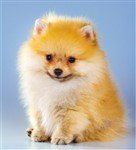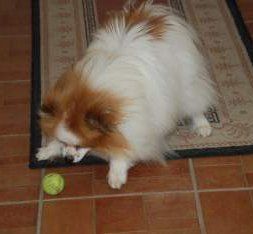Pomeranian Behavior
Overview
Expected Behavior
Each Pom is different because each has his or her own particular personality. This type of dog certainly can not be categorized by one or two words that carries over across the entire breed. That said, there are some traits that are commonly seen with the breed.
One very interesting personality trait of the
Pomeranian temperament however, is that once a Pom becomes comfortable with its owner, he will begin to copy the behavior of its owner.
For example, if a person is very loud and full of energy, in time a Pom will usually mimic that energy and be active and vocal. If a person tends to be quiet and shy, they will usually find that their Pomeranian adapts to a more quiet and relaxed state.
Those who live alone will find this breed to be a great companion...usually eager to go for walks and do other activities together....and happy to cuddle and relax when at home. This breed tends to bond very close with owners; although in some cases if it seems that a Pomeranian does not have a close bond
with an owner, some extra attention and doing more activities together may be needed to make the relationship stronger.
Being very adaptable, most will also enjoy the company of other dogs...and some even get along very well with cats.
Although a Pom is a rather small dog, generally under 10 lbs. (though some can be larger), he doesn't know it and do not try to tell him! This breed was originally a much larger sled dog and therefore the instinct to protect and guard its owner is still inbred in the Pomeranian. Even if your Pom is a quiet dog, do expect its behavior to turn up a notch if a stranger comes to the door.
A Pomeranian may bark if he senses a stranger or feels there may be impending danger to its owner. This breed may show no fear toward anything if he is in 'protection mode'.
And Poms show great loyalty to their family members. Pomeranians love
to please. They will be your best friend, your shadow, and a whole lot of personality in a little ball of fluff.
A Pom will generally adapt quite well to just about any situation. The type of environment or home that is perfect for a Pomeranian is which ever home its owner is in. This dog will be happy as a clam in a sprawling farmhouse and just as content in a small apartment.
However, a Pom must be an inside dog. Going for walks and playing around in warm temperatures will always be fun for him, but he must never be considered an outside dog, and should always be supervised with outside, even if it is in an enclosed yard.
For jaunts out into the snow, icy or very cold weather, even with that thick double coat of fur, small Poms can get easily chilled; you may find that it is advantageous to place clothes on your Pom to help maintain both for core body temperature.
Stereotypes
There is a stereotype against Pomeranian breed and other toy breed dogs that they are 'snappy' and 'yappy'. This is a generalization that is simply not true. Each dog is an individual; personality and behavior will depend on:
- The natural instinct to be a companion dog (this is in the bloodline)
- The socialization that the breeder instills during the newborn weeks, i.e. handing, hearing normal household noises, etc.
- The environment that the owner provides
If a Pomeranian is slowly introduced to elements in the world (other dogs, the noise of cars driving by, doorbells ringing, the TV, etc) then he or she should behave just fine when hearing them. If there is chaos all around, any dog would be apt to behave with excess excitement and even nervousness.
The behavior of a Pomeranian can be very calm and friendly, this is done with proper training. Nipping, growling, barking, and/or biting can often be traced to improper hierarchy and/or simply not being taught to not behave this way.
Socialization
It is first the breeder
who shapes the personality of the young Pomeranian puppy and then the owner takes over that roll. Generally, the 1st year will generally establish the personality of the dog and how he reacts to people and situations. Though, even at an adult age, a Pom can be socialized to certain elements.
The first 2- 3 months are crucial for a pup to learn about the world, become used to normal household noises, begin to potty train, learn about human touch and so forth.
A Pom that is not properly socialized may have behavioral issues; this can include inappropriate barking, signs of anxiety with visitors to your home and more. Read about bringing your puppy home and Pomeranian socialization.
Common Behavioral Issues

Sleeping Issues
This is a generally active breed and signs of sudden
lethargy and weakness
usually point to a health issue or a drastic change in the dog's environment.
With healthy Poms, there are times of being very active and then times of naps to recover from that.
Are you wondering if your Pom sleeps too much or not enough? Or how much sleep to expect with a new pup or a senior Pomeranian? Read about Pomeranian Sleeping Habits.
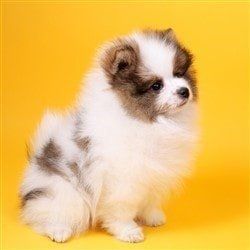
Teething & Chewing Issues
When a young pup is teething, this can be a difficult phase of intense itching and discomfort that leads to strong urges to chew. And older Poms of just about any age may develop a chewing habit due to various reasons.
While many owners struggle with this sort of thing, if you prepare for this and arm yourself with a few important tools, you can easily keep things under control.
Read more
about Pomeranian teething and chewing
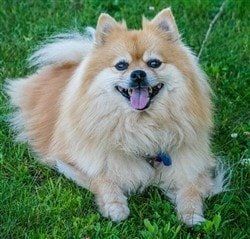
Eating Poop
Known as coprophagia, this is a common behavior issue, and it is not just unpleasant to see, it can also make a dog ill. Many dogs will eat their own feces, but some will also do this with the stools of other dogs, or even with cats.
Luckily, there are some things that you can do to help your Pomeranian stop this particular, disturbing behavior. Read more
about Poms eating feces.

Separation Anxiety
This refers to the struggles that a puppy or dog can have when home alone and faced with feeling isolated and lonely.
This is not uncommon with dogs, and especially with breeds like the Pomeranian that were developed to be lap dog companions.
Fortunately, there are some steps you can take and methods you can use, that can combine to really help a Pom. Read more
about Pom Separation Anxiety.
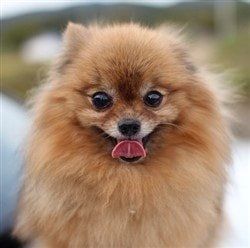
Eating Grass
Though eating greens is great for a dog, this certainly does not apply to the grass that is growing in your yard or other outdoor spaces.
When a dog has the habit of ingesting grass, this can lead to upset stomach, vomiting, possible contraction of worms, and even poisoning due to lawn care chemicals.
Read more
about Stopping a Pom from Eating Grass

24 Pomeranian Behaviors
The PetPom Book covers 24 Pomeranian behaviors, along with detailed advice and guidance for each.
In addition, it contains fantastic chapters regarding grooming, health, and all aspects of care. It is available as both a hard copy (8.5x11" soft cover) and eBook.
Read more about the PetPom Book - Comprehensive Pomeranian Care Guide

Barking
It can be frustrating to say the least if your cute little Pom is behaving like a barking machine. You've given him everything he wants, but he's still going crazy.
Though this breed can be overly stimulated by visitors to the door, and just the site of other dogs, some also seem to bark for no reason.
There are things that you can do to cut down on barking behavior, though no dog will be completely silent. Read more
about Pomeranian barking.
You may also be interested in:
Pomeranian is a Picky Eater and Other Eating Issues
- A round-up of the most common issues seen revolving around food, with detailed answers to resolve them.
Pomeranian Fearful of Loud Sounds
- Exactly how to help with fear of thunder storms, fireworks, and the vacuum cleaner.
What To Do If a Pomeranian Hates the Rain - If you're having trouble bringing your Pom outside in the rain for bathroom needs or exercise, these 9 tips can help turn things around
Pomeranian Humping Behavior
- The reasons why both female and males may do this and how, when it's warranted, to stop this behavior.
Best Supplies for a Pomeranian
- The essentials needed to take optimal care of a Pom.

